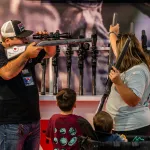We’re answering the “how” and “why” of health and safety news. Sign up for our daily newsletter.
At work as a pediatrician, Annie Andrews sees firearm injuries as a “huge public health crisis.” When she ran to represent South Carolina in the U.S. House, Andrews routinely heard from mothers on the campaign trail about their feelings of helplessness and hopelessness about what to do about gun violence.
And as a mom to three children — ages 6, 8 and 11 — she sees how simple parent-to-parent interactions are key to reducing potential harm to children. Given the rates of accidental shooting deaths among children, something as simple as a text message could literally save lives.
Before her son went on a recent playdate, Andrews texted the friend’s mother: “Henry is so excited for the playdate tomorrow. I just want to let you know he’s a strong swimmer, he’s a little bit afraid of dogs, he has no allergies and he’s a very curious boy so I always ask everyone, are there any firearms in the home and if so how are they stored?”
Even in deep red South Carolina, where many people own guns or know gun owners, Andrews said the text is always well-received.
“Universally, the response I get to a text message like that is, ‘Oh my gosh, that’s such a great question. Thank you for asking,” Andrews said.
Children and teenagers are more likely to die from guns than any other cause of death in the United States — and the number of gun deaths among children and teens in America jumped by over 50 percent between 2019 and 2021 alone. And while parents have long expressed fears about school shootings, the majority of gun-related deaths happen elsewhere. Homicide is the number one cause of death by guns among children and teens overall, with suicide making up a substantial share of deaths among teens and preteens and accidents accounting for the most deaths in children under the age of 5.
Experts say that all of these causes of death could be significantly curbed not only by the implementation of safe storage laws, but by parents not being afraid to ask each other about if there are guns in the home. With moms disproportionately charged with making decisions about their children’s extracurricular and social lives, their choices about whether or not to ask about gun storage in homes puts them on the frontlines of the American gun violence epidemic, often without their even realizing.
“I wouldn’t let my kids go to someone’s house unless a parent was there. If we’re not doing that same thing with guns, then we’re not taking gun safety seriously,” Katherine Schweit, a former FBI mass shooting investigator and the author of “How To Talk About Guns With Anyone,” told The 19th.
Schweit says that because there is more media coverage of public violence, and school shootings in particular, than other forms of gun violence, many parents may not understand the risks their children face by simply playing at another child’s home.
“If we want to cut firearm deaths in half in the United States, we could do a better job of preventing suicides and keeping unsecured guns out of the hands of children,” Schweit said.
More children die in accidental gun shootings than die in mass shootings every year.
Katherine Schweit
This starts, she said, with parents talking to each other about guns. While many parents are afraid to broach the subject with other parents for fear of stepping into “a political war,” these conversations can save lives.
“It’s important that parents know that children are safer at schools than they are at home,” she said. “More children die in accidental gun shootings than die in mass shootings every year.”
Schweit points to a 2021 Centers for Disease Control and Prevention report that looks at data from gun violence deaths in the United States in 2020; the report identified 535 deaths that were considered to be unintended fatalities with guns. Of these 535 unintentional deaths, 149 of these were children. In comparison, 32 children died as a result of school shootings during the 2019-2020 school year.
Jennifer Stapleton lives in Evergreen, Colorado, and is the mom of two children, ages 14 and 10. Almost 15 years ago, she and her wife were the victims of gun violence when they were carjacked at gunpoint while Stapleton was pregnant. Stapleton became active with Moms Demand Action, where she worked as a volunteer in Maryland for over nine years. In her experience there, she learned about the group’s BeSMART program, a nonpartisan initiative to help parents ask about guns and gun storage at home. She says through this program, she learned that “every time your kid goes anywhere that you have not already personally vetted you need to ask, ‘Do you have guns?’ and if they do, ask, ‘Are they safely stored, locked and unloaded?’ And that is what I did.”
When her children were small, it was a question she routinely asked before every playdate. Now that her children are older, she said she has taught them to “advocate for themselves” similar to the way she has taught them to respond if they are offered drugs or alcohol at someone’s house — and to get out of the room as quickly as possible if any child or adult moves to show them a firearm. She said she has told her own son, “14-year-olds accidentally shoot each other because they’re just trying to be cool, showing off their weapon. That’s the danger for you now.”
I just think about this as a safety issue for my children.
Jennifer Stapleton
Stapleton said part of having this conversation with other parents — and teaching older children how to navigate these conversations with peers — means not demonizing gun owners.
“I grew up in Tennessee. Everybody in my family owns a gun,” Stapleton said. “I’m not a person that judges and thinks, ‘Well if you own a gun, you’re a bad person.’ I just think about this as a safety issue for my children. I wouldn’t let them play when they were little at a house with a pool if they didn’t have a pool fence.”
Andrews noted that on the campaign trail, she often talked about the connection between safe storage laws and school shootings — stressing that parents can do something by asking about unsecured guns in the home, a key source of access to weapons for school shooters.
“What you can do today is you can go home and you can look at whether the guns in your home are secured,” Andrews said. “You can start tomorrow asking other parents about the presence of guns in the homes and cars where your children go.”
-
Read Next:
She adds that from where she sits as a pediatrician and gun safety advocate, one of the biggest misperceptions she encounters is that very young children are not strong enough to actually pull a trigger. She explained that a child as young as two often can do this by using both of their thumbs — which means the barrel of a gun is pointed directly at them in order to do so.
Andrews says a new study shows why it is so important for parents to talk to each other about guns: Assuming a child isn’t strong enough to pull a trigger or not eager to explore a home is not enough.
A new analysis by JAMA Pediatrics found that children between the ages of 8 and 12 years who viewed a one-minute gun safety video at home and then found a real gun hidden in a drawer in the controlled laboratory setting were more cautious than children in a control group who viewed a video about car safety. In the experiment, conducted on 226 children, children who had viewed one of the two videos at home were left in a room in the researchers’ laboratory that had been stocked with a variety of games and toys — as well as two unloaded and disabled handguns that had been “hidden” in a drawer. The researchers outfitted the real guns with sensors that counted the number of times a trigger was pulled with sufficient force to discharge the gun.
We cannot rely on curious children to not find a gun — it is the adult’s responsibility to develop a secure storage plan for their own home.
Annie Andrews
But merely watching the short video about gun safety made a huge impact on what happened next. While 95.6 percent of the children in the experiment found the handguns in a 20-minute period; 33.9 percent of those children who saw the gun safety video told an adult they had discovered a gun while only 10.6 percent of children who saw the car safety video did the same. More than 50 percent of all the children ended up handling the gun, but only 9 percent of those children who saw the gun safety video pulled the trigger, compared with almost 30 percent of children from the car safety video group.
“Children are curious by design,” Andrews said. “They find Christmas presents every December — they’re going to find the gun in your nightstand drawer or high up on the closet shelf or under your mattress. We cannot rely on curious children to not find a gun — it is the adult’s responsibility to develop a secure storage plan for their own home.”







